Throughout the screaming,
Silence reigns supreme,
Lightning blasts,
And thunder roars,
Winds howl,
And darkness takes hold,
Content within the struggle,
In the eye of the storm,
I sit in peace.
Monthly Archives: October 2020

Thread of Life
a poem by Christina Rossetti
1
The irresponsive silence of the land,
The irresponsive sounding of the sea,
Speak both one message of one sense to me: —
Aloof, aloof, we stand aloof, so stand
Thou too aloof bound with the flawless band
Of inner solitude; we bind not thee;
But who from thy self-chain shall set thee free?
What heart shall touch thy heart? what hand thy hand?—
And I am sometimes proud and sometimes meek,
And sometimes I remember days of old
When fellowship seemed not so far to seek
And all the world and I seemed much less cold,
And at the rainbow’s foot lay surely gold,
And hope felt strong and life itself not weak.
2
Thus am I mine own prison. Everything
Around me free and sunny and at ease:
Or if in shadow, in a shade of trees
Which the sun kisses, where the gay birds sing
And where all winds make various murmuring;
Where bees are found, with honey for the bees;
Where sounds are music, and where silences
Are music of an unlike fashioning.
Then gaze I at the merrymaking crew,
And smile a moment and a moment sigh
Thinking: Why can I not rejoice with you ?
But soon I put the foolish fancy by:
I am not what I have nor what I do;
But what I was I am, I am even I.
3
Therefore myself is that one only thing
I hold to use or waste, to keep or give;
My sole possession every day I live,
And still mine own despite Time’s winnowing.
Ever mine own, while moons and seasons bring
From crudeness ripeness mellow and sanative;
Ever mine own, till Death shall ply his sieve;
And still mine own, when saints break grave and sing.
And this myself as king unto my King
I give, to Him Who gave Himself for me;
Who gives Himself to me, and bids me sing
A sweet new song of His redeemed set free;
He bids me sing: O death, where is thy sting?
And sing: O grave, where is thy victory?
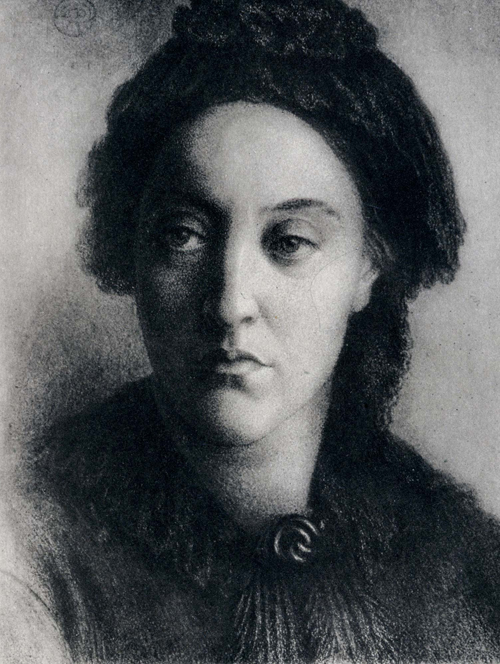

Poetically a portion of The Cathedral
At Chartres
this state of collapse was
still present,
but some indulgent tenderness
presently enwrapped
and warmed the spirit.
The soul as it recovered was
no longer alone;
it was encouraged
and perceptibly helped
by the Virgin,
who revived it.
And this impression,
peculiar to this crypt,
permeated the body too;
it was no longer a feeling
of suffocating for lack of air;
on the contrary,
it was the oppression of inflation,
of over-fulness,
which would be mitigated
by degree,
allowing of easy breathing
at last.
J.K. Huysmans
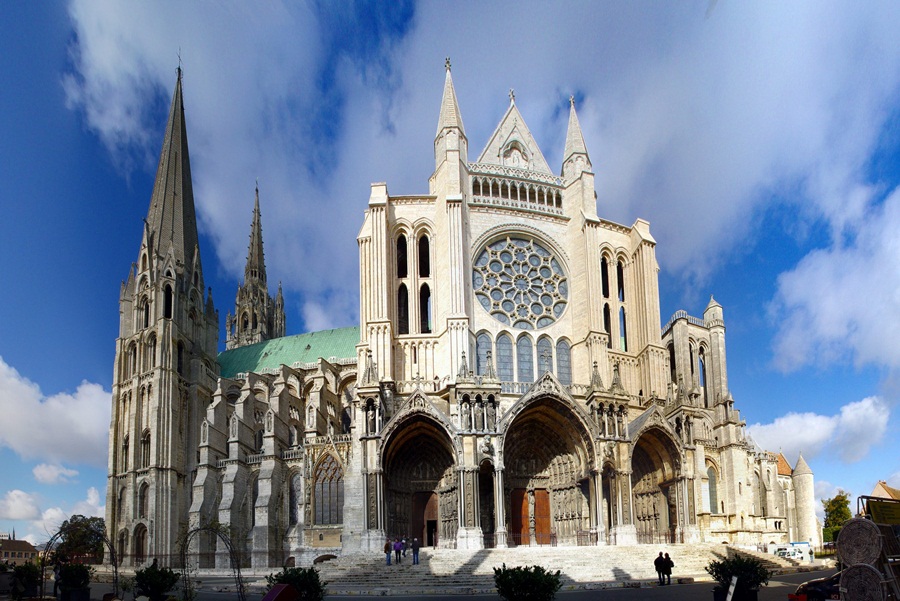

Evening at St Charles
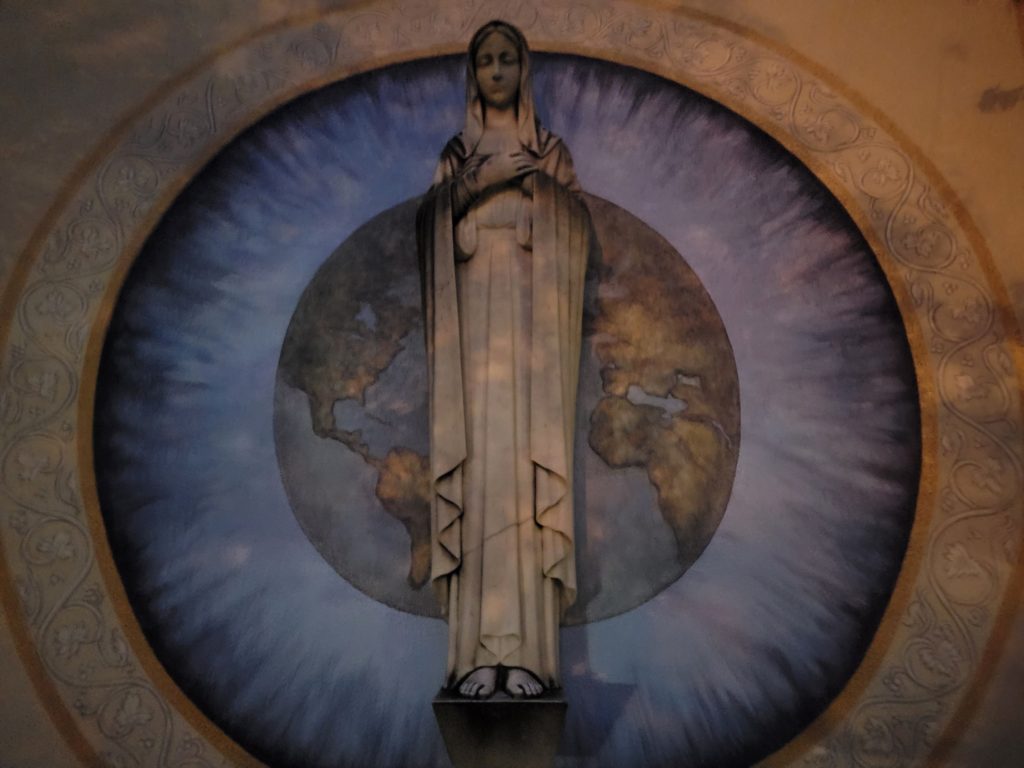
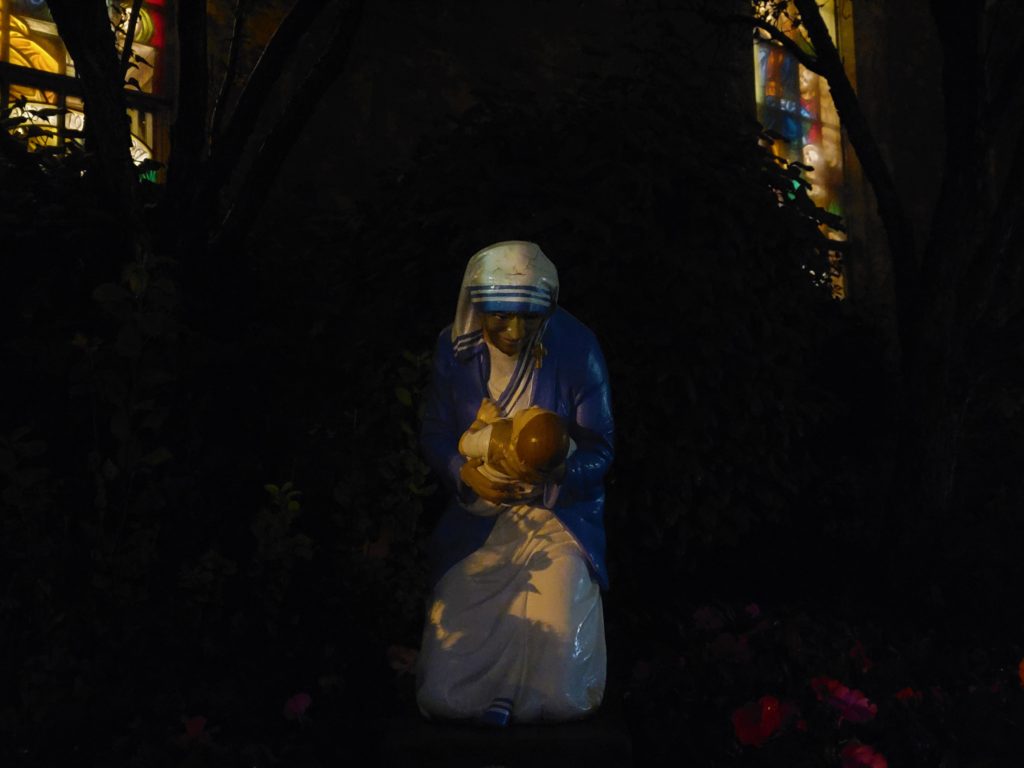

A vivid dream
Last night, I experienced a dream that lingered throughout Mass; thoughts and images nicely roaming in my mind. I was visiting a Catholic family from my young adult years. I was friends with the eldest son. The mother and children of the family were hosting a gathering. Distinctly, I recognized among those attending a distant friend, Joe, a decadent leader of what we perceived as artistic expressive years—a time of experience, the enduring of lost innocence, desperately searching for identity. Joe was lying face down on the floor, not speaking to anyone, ignoring everyone. Polite conversation flowed otherwise.
In a dream-state fashion, I was reclining upon a comfortable couch, at ease with the conversation. The family always presented an amiable environment, encouraging conversation. There were three brothers and two sisters, along with the mother. The father was absent, passing away ten years or so in the past, collapsing on Christmas Eve while descending basements steps for the unwrapping of Christmas gifts. A cat was lying upon my chest. Upbeat, the cat began soulfully singing a Motown classic.
I remember mama said, “you can’t hurry love
No, you’ll just have to wait”
She said, “love don’t come easy
It’s a game of give and take”
How long must I wait
How much more must I take
Before loneliness
Will cause my heart, heart to break
The cat sang wonderfully. If it were not odd enough that a cat could sing, I noticed the cat never moved her mouth while singing. Her emotionally tinged words resonated in my mind, relaxing and putting me at ease. Her singing continued.
I looked to the mother of the family, complimenting her cat’s musical expression.
“You can hear her singing.”
“Yes.”
“Nice. Not many can perceive her precious vocal abilities.”
Ceasing her performance, the cat rose upon my chest, stretching, dragging her aged body off of mine. She walked back and forth upon the crest of the couch’s back. Lumbering, she difficultly made her way to the couch’s arm, and then the floor, walking in a circle, parading herself. I realized the cat was old, so old I feared she was near the end of her life. The cat halted her movement, staring into my eyes. I called for her. Awkwardly, she made her way back onto my chest. She spoke.
“My voice is young, innocent, hopeful, emotionally carefree, yet my body is old. My body brings forth a desire to die, to leave this world. I have lived nine lives, as they say, and now I am content with an end. However, buried deeply, I harbor regrets, longing for the days of my youth when I was arrogantly wise–stupid in fact, yet brave, sly, willing and agile. I want to relive my youth—to do all the same things over again—to be kinder and more considerate of others, less concerned with myself. Yet I accept that will never happen. Now all I have is my singing and that is limited since so few can hear the song within my mind and heart. The mother over there is a captive audience. She has always been able to hear me sing, even when I was the little kitten she first adopted.”
I looked back to the mother of the family, yet as it happens in a dream, things unrealistically changed. The mother was now the Virgin Mary. Our Holy Mother bowed her head in divine humility, raising her hands, palm upwards, as she lowered her face from sight. A tangible holiness spread throughout my dream perceptions.
The cat continued. “So…you see Her also. Excellent. I have something to tell you. Listen closely. You must understand that demons are lurking about, in fact a vast demonic patrol follows you around. They sense there is grace being dispensed. Their mischievous and jealous natures demand they interfere. However, with the Simple One of Grace so near they are blinded. You must comprehend the vitality of simplicity. Demons despise the simple. The simple ways of Jesus Christ, the Son of God, the Savior of Mankind, His simple ways confound and paralyze them. They command complexity, clamoring for chaos. Mary, the Handmaid of God, the Queen of Heaven, her simplicity also renders them useless and defeated. Where they call forth a battle, she returns nothing to contend with, simply and instantly crushing them. They desire details, dispute, debate, and confrontation, constantly seeking nooks and crannies in which to hide and lodge a base for their desperate need to challenge, their perpetual effort of usurpation. They thrive in an abundance of words and the proliferation of ideas. Remain simple, let your Yes be a Yes and your No be a No; refrain from too many words. Keep your words minimal. The more you speak, the more you present to the world, the more cracks and crevices you present to the demonic. Vanity of vanities, the more you try, the more you offer the demonic a niche in which to entrench themselves. You may think you are fighting against Satan, only to turn and realize he is right there next to you, urging you on with a passion.”
I moved my attention from the prophetess cat and her eternal words, focusing upon Joe lying prostrate upon the floor. He was miserable, forlorn and submissive. However, interiorly I knew an obstinacy ruled. He always needed to feel he was in control. The cat desired to be free of her aged body not to escape pain, yet to transform into that which was freedom–a higher state of being, maturity and moving forward. The cat respected her past, while remaining lovingly detached from it. Joe, collapsed within the futility of brokenness, never gave up on his delusions. He was dependently stuck in his past. His will had always, and would always, rule. In truth, his tenacious and ferocious will was the root of all his problem, yet habituation and stubbornness would never allow brutal honesty to call for a penetrating self-introspection. The freeing of himself from his dominating will could never be achieved. His vulnerability to sin had advanced to addiction, a dependence upon pride and consumption. Advancing into his elderly years, he was forced to consume the world with his bitterness and frustration, able to strike out only in the perversion of his mind. At a time when his heart should be growing softer, he forced it to grow hard: scirrhous, thorny, and calloused. His only solace was sin, and within the sin only torment—advanced unrecognized shame existed where shame had long since been corroded away; guilt replaced by a ceaseless blinding numbness. In the dream of a reconciling familial sharing, he could only collapse into a silent recoiling, unable to express himself or recognize others.
The dream inconclusively advanced into a lack of comprehension.

La Salette novel conversion reflections by the former decadent French writer of ‘A rebours’ (Against the Grain/Nature)
“Mary vouchsafes to appear under various aspects to satisfy the tastes and cravings of each soul. At La Salette, where She descended in a distressful spot, all in tears, She revealed Herself no doubt to certain persons, more especially to the souls in love with sorrow, the mystical souls that delight in reviving the anguish of the Passion and following the Mother in Her heart-breaking way to the Cross. She would thus seem less attractive to the vulgar who do not love woe or weeping; it may be added that they still less love reproof and threats. The Virgin of La Salette could not become popular, by reason of Her aspect and address, while She of Lourdes, who appeared smiling, and prophesied no catastrophes, was easy of access to the hopes and gladness of the crowd.
“She was, in short, in that sanctuary, the Virgin of the world at large, not the Virgin of mystics and artists, the Virgin of the few, as at La Salette.
“What a mystery is this direct intervention of the Christ’s Mother on earth!” thought Durtal.
And he went on: “It is clear, on reflection, that the churches founded by Her may be classed in two very distinct groups.
“One group where She has revealed Herself to certain persons, where waters spring and bodily ills are healed: La Salette and Lourdes.
“The other, where She has never been gazed on by human beings, or where Her appearance occurred in immemorial times, in forgotten centuries, the dead ages. In those chapels prayer alone is in force, and Mary answers it without the help of any waters. Indeed, She effects more moral than physical cures…
“Wherefore this difference? None can understand, and probably none will ever know. At most may we suppose that in compassion for the everlasting craving of our hapless souls wearied with prayer without sight, She would fain confirm our faith and help to gather in the flock by showing Herself.
“In all this obscurity,” Durtal went on, “is it at least possible to discern some dim landmarks, some vague law?
“As we gaze into the darkness, two spots of light appear,” he replied to himself.
“In the first place, this: She appears to none but the poor and humble; She addresses the simple souls who have in a way handed down the primitive occupation, the biblical function of the Patriarchs; She unveils herself to the children of the soil, to the shepherds, to girls as they watch the flock. Both at La Salette and at Lourdes She chose little pastors for Her confidants, and this is intelligible, since, by acting thus, she confirms the known will of Her Son; the first to behold the infant Jesus in the manger at Bethlehem were in fact shepherds, and it was from among men of the lowest class that Christ chose His apostles. (Novel published in 1898 before Fatima. Note: link to the Ultimate Guide to Marian Apparitions).
“And is not the water that serves as a medium of cure prefigured in the Sacred Books—in the Old Testament by the River Jordan, which cleansed Naaman of his leprosy; and in the New by the probationary pool stirred by an angel?
“Another law seems no less probable. The Virgin is, as far as possible, considerate of the temperament and individual character of the persons She appears to. She places Herself on the level of their intellect, is incarnate in the only material form that they can conceive of. She assumes the simple aspect these poor creatures love, accepting the blue and white robes, the crown and wreaths of roses, the trinkets and garlands and frippery of a first Communion, the ugliest garb. (Basilica of the National Shrine of the Immaculate Conception in Washington DC has numerous chapels on its lower level honoring Marian Apparitions, displaying the wonderful garb worn by our Beautiful Holy Mother).
“There is not indeed a single case where the shepherd maids who saw Her described Her otherwise than as a ‘beautiful lady’ with the features of the Virgin of a village altar, a Madonna of the Saint-Sulpice shops, a street-corner Queen.
“These two rules are more or less universal,” said Durtal to himself. “As to the Son, it would seem that He never now will reveal Himself in human form to the masses. Since His appearance to the Blessed Mary Margaret, whom He employed as a mouthpiece to address the people, He has been silent. He keeps in the background, giving precedence to His Mother. (Once again keep in mind the novel’s pre-twentieth century time, before the life of St Faustina and Our Lord’s Divine Mercy visitations).
“He, it is true, reserves for Himself a dwelling in the secret places, the hidden regions, the strongholds of the soul, as Saint Theresa calls them; but His presence is unseen and His words spoken within us, and generally not apprehended by means of the senses.”
Durtal ceased speaking, confessing to himself how inane were these reflections, how powerless the human reason to investigate the inconceivable purposes of the Almighty; and again, his thoughts turned to that journey to Dauphiné which haunted his memory.
“Ah! but the chain of the High Alps and the peaks of La Salette,” said he to himself; “that huge white hotel, that church colored with dirty yellow lime-wash, vaguely Byzantine and vaguely Romanesque in its architecture, and that little cell with the plaster Christ nailed to a flat black wooden Cross—that tiny Sanctuary plainly white-washed, and so small that one could step across it in any direction—they were pregnant with her presence, all the same!”
“Surely She revisited that spot, in spite of Her apparent desertion, to comfort all comers; She seemed so close at hand, so attentive and so grieving, in the evening as one sat alone by the light of a candle, that the soul seemed to burst open like a pod shedding the fruit of sin, the seeds of evil deeds; and repentance, that had been so tardily evolved, and sometimes so indefinite, became so suddenly despotic and unmistakable that the penitent dropped on his knees by the bed, and buried his head sobbing in the sheets. Ah, those were evenings of mortal dullness and yet sweetly sad! The soul was rent, its very fibers laid bare, but was not the Virgin at hand, so pitiful, so motherly, that after, the worst was over She took the bleeding soul in her arms and rocked it to sleep like a sick child.
“Then, during the day, the church afforded a refuge from the frenzy of giddiness that came over one; the eye, bewildered by the precipices on every side, distracted by the sight of the clouds that suddenly gathered below and steamed off in white fleece from the sides of the rocks, found rest under the shelter of those walls.
“And finally, to make up for the horrors of the scene and of the statues, to mitigate the grotesqueness of the inn-servants, who had beards like sappers and clothes like little boys—the caps, and Holland blouses with belts, and shiny black breeches, like cast iron, of the children at the Saint Nicolas school in Paris—extraordinary characters, souls of divine simplicity expanded there.”
And Durtal recollected the admirable scene he had watched there one morning.
He was sitting on the little plateau, in the icy shade of the church, gazing before him at the graveyard and the motionless swell of mountain tops. Far away, in the very sky, a string of beads moved on, one by one, on the ribbon of path that edged the precipice. And by degrees these specks, at first merely dark, assumed the bright hues of dresses, assumed the form of colored bells surmounted by white knobs, and at last took shape as a line of peasant women wearing white caps.
And still in single file they came down the square.
After crossing themselves as they passed the cemetery, they went each to drink a cup of water at the spring and then turned round; and Durtal, who was watching them, saw this:
At their head walked an old woman of at least a hundred, very tall and still upright, her head covered by a sort of hood from which her stiff, wavy hair escaped in tangled grey locks like iron wire. Her face was shriveled like the peel of an onion, and so thin that, looking at her in profile, daylight could be seen through her skin.
She knelt down at the foot of the first statue, and behind her, her companions, girls of about eighteen for the most part, clasped their hands and shut their eyes; and slowly a change came over them.
Under the breath of prayer, the soul, buried under the ashes of worldly cares, flamed up, and the air that fanned it made it glow like an inward fire, lighting up the thick cheeks, the stolid, heavy features. It smoothed out the crackled surface of wrinkles, softened in the younger women the vulgarity of chapped red lips, gave color to the dull brown flesh, overflowed in the smile on lips half parted in silent prayer, in timid kisses offered with simple good faith, and returned no doubt in an ineffable thrill by the Holy Child they had cherished from His birth, who, since the martyrdom of Calvary, had grown to be the Spouse of Sorrows.
They felt, perhaps, something of the raptures of the Blessed Virgin who is Mother and Wife and at the same time the beatified Handmaid of God.
And in the silence a voice as from the remotest ages arose, and the ancestress said, “Pater Noster,” and they all repeated the prayer, and then dragged themselves on their knees up the steps of the way of crosses, where the fourteen upright posts, each with its cast metal bas-relief, bordered a serpentine path, dividing the statues from the groups. Thus they went forward, stopping long enough to recite an Ave on each step they climbed, and then, helping themselves with their hands, they mounted to the next. And when the Rosary was ended the old woman rose, and they solemnly followed her into the church, where they all prayed a long time, prostrate before the altar; and the grandmother stood up, gave each holy water at the door, led her flock to the spring where they all drank again, and then they went away, without speaking a word, one after another up the narrow path, ending as black specks just as they had come, and vanishing on the horizon.
“Those women have been two days and two nights crossing the mountains,” said a priest, coming up to Durtal. “They started from the depths of Savoy, and have travelled almost without rest to spend a few minutes here; they will sleep tonight in a cow-house or a cave, as chance may direct, and tomorrow by daybreak they will start again on their weariful way.”
Durtal was overpowered by the radiant splendor of such faith.
J.K. Huysmans novel “The Cathedral”
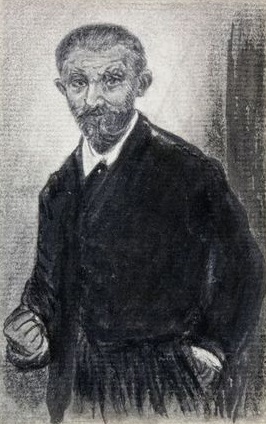

God Speaks:
Portion of a poem by Charles Peguy
It is innocence that is full and experience that is empty.
It is innocence that wins and experience that loses.
It is innocence that is young and experience that is old.
It is innocence that grows and experience that wanes.
It is innocence that is born and experience that dies.
It is innocence that knows and experience that does not know.
It is the child who is full and the man who is empty,
Empty as an empty gourd and as an empty barrel:
That is what I do with that experience of yours.
Now then, children, go to school.
And you men, go to the school of life.
Go and learn
How to unlearn.
…………………………………………
Nothing is so beautiful as a child going to sleep
while he is saying his prayers, says God.
I tell you nothing is so beautiful in the world.—
And yet I have seen beautiful sights in the world.
And I know something about it. My creation is
overflowing with beauty.
My creation overflows with marvels.
There are so many that you don’t know where to put them.
I have seen millions and millions of stars rolling
under my feet like the sands of the sea.
I have seen days as scorching as flames,
Summer days of June and July and August.
I have seen winter evenings spread out like a cloak….


Recent Comments